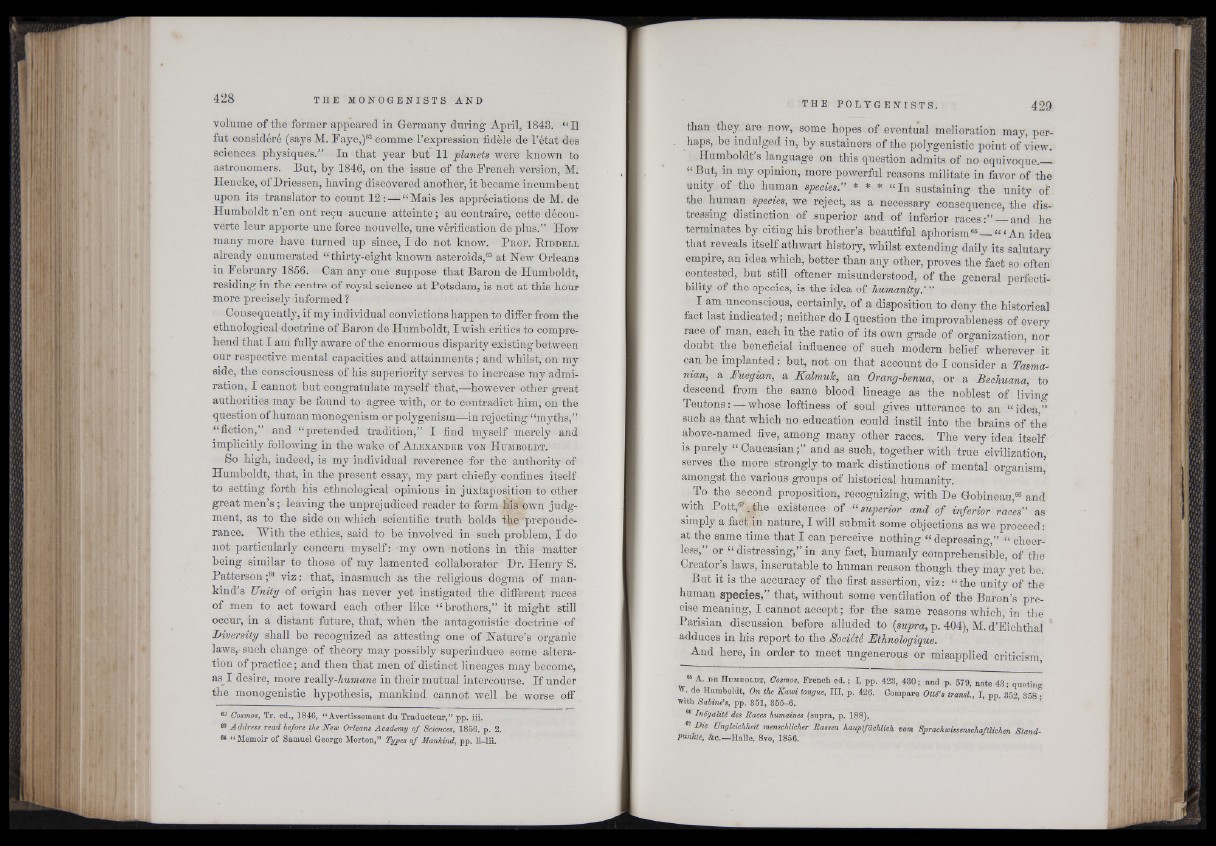
volume of the former appeared in Germany during April, 1843. “ H
fut considéré (says M. Paye,)63 comme l’expression fidèle de l’état des
sciences physiques.” In that year but 11 planets were known to
astronomers. But, by 1846, on the issue of the French version, M.
Hencke, of Driessen, having discovered another, it became incumbent
upon its translator to count 12 : — “ Mais les appréciations de M. de
Humboldt n’en ont reçu aucune atteinte ; au contraire, cette découverte
leur apporte une force nouvelle, une vérification de plus.” How
many more have turned up since, I do not know. P rof. R idde l l
already enumerated “thirty-eight known asteroids,63 at Hew Orleans
in February 1856. Can any one suppose that Baron de Humboldt,
residing in the centre of royal science at Potsdam, is not at this hour
more precisely informed ?
Consequently, if my individual convictions happen to differ from the
ethnological doctrine of Baron de Humboldt, I wish critics to comprehend
that I am fully aware of the enormous disparity existing between
our respective mental capacities and attainments ; and whilst, on my
side, the consciousness of his superiority serves to increase my admiration,
I cannot but congratulate myself that,—however other great
authorities may be found to agree with, or to contradict him, on the
question of human monogenism or polygenism—in rejecting “myths,”
“ fiction,” and “ pretended tradition,” I find myself merely and
implicitly following in the wake of A l ex a n d e r von H umboldt.
So high, indeed, is my individual reverence for the authority of
Humboldt, that, in the present essay, my part chiefly confines itself
to setting forth his ethnological opinions in juxtaposition to other
great men’s ; leaving the unprejudiced reader to form.* his !Own judgment,
as to the side on which scientific truth holds the ^preponderance.
With the ethics, said to be involved in such problem, I do
not particularly concern myself: -my own notions in this matter
being similar to those of my lamented collaborator Dr. Henry S.
Patterson;64 viz: that, inasmuch as the religious dogma of mankind’s
Unity of origin has never yet instigated the different races
of men to act toward each other like “ brothers,” it might still
occur, in a distant future, that, when the antagonistic doctrine of
Itiversity shall be recognized as attesting one of Hature’s organic
laws,- such change of theory may possibly superinduce some alteration
of practice; and then that men of distinct lineages may become,
as I desire, more really-humane in their mutual intercourse. If under
the monogenistic hypothesis, mankind cannot well be worse ofl‘
62 Cosmos, Tr. ed., 1846, “ Avertissement du Traducteur,” pp. iii.
63 Address read before the New Orleans Academy of Sciences, 1856, p. 2.
« “ Memoir of Samuel George Morton,” Types of Mankind, pp. li-lii.
than they, are now, some hopes of eventual melioration may, perhaps,
be indulged in, by sustainers of the polygenistic point of view-.
Humboldt s language on this question admits of no equivoque.__
1 But, in my opinion, more powerful reasons militate in favor of the
unity of the human species.” * * * “ In sustaining the unity of
the human species, we reject, as a necessary consequence, the distressing
distinction of superior and of inferior races:” — and he
terminates by citing his brother’s beautiful aphorism65 “ ‘An idea
that reveals itself athwart history, whilst extending daily its salutaiy
empire, an idea which, better than any other, proves the fact so often
contested, but still oftener misunderstood, of the general perfectibility
of the species, is the idea of humanity.’ ”
I am unconscious, certainly, of a disposition to deny the historical
fact last indicated; neither do I question the improvableness of every
race of man, each in the ratio of its own grade of organization, nor
doubt the beneficial influence of such modern belief wherever it
can be implanted : but, not on that account do I consider a Tasmo*
nian, a Fuegian, a Kalmulc, an Orang-henua, or a Bechuana, to
descend from the same blood lineage as the noblest of living
Teutons:—whose loftiness of soul gives utterance to an “ idea,”
such as that which no education could instil into the brains of the
above-named five, among many other races. The very idea itself
is purely “ Caucasian ; and as such, together with true civilization,
serves the more strongly to mark distinctions of mental organism’
amongst the various groups of historical humanity.
To the second proposition, recognizing, with De Gobineau,66 and
with Pott,67.the existence of “ superior and of inferior races" as
simply a faèt in nature, I Will submit some objections as we proceed:
at the same time that I can perceive nothing “ depressing,” “ cheerless,”
or “ distressing,” in any fact, humanly comprehensible, of the
Creator’s laws, inscrutable to human reason though they may yet be.
But it is the accuracy of the first assertion, viz: “ the unity of the
human species,” that, without some ventilation of the Baron’s precisemeaning,
I cannot accept ; for the same reasons which, in the
Parisian discussion before alluded to {supra, p. 404), M. d’Eiehthal *
adduces in his report to the Société Ethnologique.
And here, in order to meet ungenerous or misapplied criticism,
66 A. DE H u m b o l d t , Cosmos, French ed. ; I , pp. 423, 430; and p. 579, note 43 ; quoting
w. de Humboldt, On the Kawi tongue, III, p. 426. Compare Otté’s transi., I, pp 352 358 •
with Sabine's, pp. 351, 355-6. ’ ’
66 Inégalité des Races humaines (supra, p. 188).
67 Die Ungleichheit mensehlicher Rassen hauptfdchlich vom Sprachwissenschafllichen Stand-
punkte, &c.—Halle, 8vo, 1856.